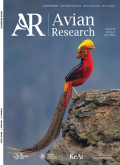首页|期刊导航|Avian Research|The Crested Ibises expanding to plain areas exhibit a higher tolerance of human proximity
Avian Research2024,Vol.15Issue(1):P.60-65,6.DOI:10.1016/j.avrs.2024.100165
The Crested Ibises expanding to plain areas exhibit a higher tolerance of human proximity
摘要
关键词
Anti-predation behavior/Flight initiation distance/Habitat expansion/Human activity/Nipponia nippon分类
生物科学引用本文复制引用
Yuqi Zou,Yiting Jiang,Zitan Song,Xiaobin Fang,Changqing Ding..The Crested Ibises expanding to plain areas exhibit a higher tolerance of human proximity[J].Avian Research,2024,15(1):P.60-65,6.基金项目
supported by National Natural Science Foundation of China(No.32270554 to CD)。 (No.32270554 to CD)

